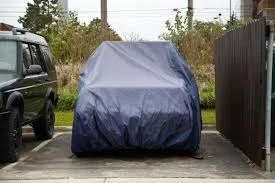Portable carports have become one of the most practical and cost-effective solutions for vehicle protection. Whether you want to shield your car from harsh sunlight, rain, dust, hail, or falling debris, a portable carport offers reliable coverage without the expense or permanence of a traditional garage. Their flexibility, ease of installation, and affordability make them a popular choice for homeowners, renters, travelers, and small businesses alike.
In this guide, we’ll break down everything you need to know about portable carports—their benefits, types, materials, uses, setup process, and tips for choosing the right structure.
What Is a Portable Carport?
A portable carport is a freestanding, movable structure designed to protect vehicles and outdoor equipment. Unlike permanent carports or garages, portable units don’t require foundations, heavy construction, or building permits in most cases. They typically consist of a steel or aluminum frame covered by a fabric or polycarbonate canopy.
Because they are lightweight and transportable, portable carports can be assembled, disassembled, or relocated whenever needed.
Key Benefits of Portable Carports
1. Cost-Effective Vehicle Protection
Portable carports are significantly cheaper than permanent garages or steel carports. You avoid expenses like concrete slabs, labor costs, and construction materials. For budget-conscious homeowners or renters, this is one of the strongest advantages.
2. Quick and Easy Installation
Most portable carports can be put together in a few hours using basic tools. Many designs are DIY-friendly, eliminating the need for professional installers.
3. Flexible and Movable
Renters or mobile homeowners love portable carports because they can be moved as needed. Whether you’re shifting parking spots or relocating to a new home, the carport goes with you.
4. All-Weather Protection
These structures offer solid protection from:
-
Sun UV rays
-
Rain and storms
-
Hail
-
Snow (heavy-duty models)
-
Tree sap and falling leaves
-
Bird droppings
-
Dust and debris
While not as strong as permanent steel carports, portable options still deliver reliable day-to-day protection.
5. Multi-Purpose Use
Portable carports are not just for cars. They can shelter:
-
Boats
-
RVs
-
Motorcycles
-
Lawn equipment
-
ATVs
-
Garden tools
-
Outdoor events
Their open-frame design makes them incredibly versatile.
Types of Portable Carports
1. Canopy-Style Portable Carports
These feature a steel frame with a polyester or polyethylene canopy. They are lightweight, easy to assemble, and ideal for temporary use. Canopy carports are popular for:
-
Daily car shade
-
Seasonal protection
-
Backyard events
2. Heavy-Duty Portable Carports
Built with reinforced frames and thicker covers, these are designed for long-term outdoor use. They can withstand moderate snowfall and strong winds when properly anchored.
3. Enclosed Portable Carports
These models include sidewalls and zippered doors. They create a tent-like garage, offering more complete protection from dust, animals, and weather.
4. Portable Metal Carports
Some portable carports use lightweight aluminum or modular steel panels instead of fabric. Although less common, they offer better durability and fire resistance.
Common Materials Used in Portable Carports
Frame Materials
-
Galvanized Steel: Strong, rust-resistant, and long-lasting
-
Powder-Coated Steel: Improved weather resistance and durability
-
Aluminum: Lightweight but slightly less sturdy
Roof and Wall Materials
-
Polyethylene (PE): UV-treated, waterproof, and budget-friendly
-
Polyester Fabric: Lightweight but may wear faster
-
PVC Tarp: Heavy-duty, fire-resistant, excellent for long-term use
-
Polycarbonate Panels: Used in rigid portable structures
These material choices impact the lifespan, appearance, and protective strength of the carport.
Top Uses for Portable Carports
1. Vehicle Storage
The primary purpose is to shield cars, trucks, motorcycles, and SUVs from environmental damage.
2. Boat and RV Protection
Portable carports help block UV rays that fade exteriors and weaken fiberglass or paint.
3. Outdoor Workshops
Woodworkers, mechanics, and hobbyists use portable carports as shade structures for outdoor work.
4. Farm and Garden Equipment Storage
Keep tools, mowers, and tractors protected from rust and rain.
5. Temporary Event Shelters
They function well for:
-
Backyard parties
-
Farmers markets
-
Car repair sessions
How to Set Up a Portable Carport
Step 1: Choose a Level Spot
A flat surface ensures stability and prevents premature wear on the canopy.
Step 2: Assemble the Frame
Follow the manufacturer's instructions. Most frames use snap-on or bolt-together fittings.
Step 3: Attach the Canopy Cover
Secure the fabric using elastic ball ties, clips, or Velcro straps.
Step 4: Anchor the Structure
Anchoring is crucial for safety. Options include:
-
Ground stakes
-
Auger anchors
-
Concrete weights
-
Heavy-duty anchors for windy areas
Step 5: Maintenance
Regularly tighten straps, check for rust, and inspect canopy wear. Proper care extends lifespan.
How to Choose the Right Portable Carport
1. Size Requirements
Measure your vehicle and ensure extra clearance for doors, mirrors, and movement. Popular sizes include:
-
10×20 ft
-
12×24 ft
-
18×20 ft (for trucks & SUVs)
2. Durability
Look for heavy-duty steel frames, UV-protected covers, and thick fabric.
3. Weather Conditions
If you live in an area with snow or wind, choose a reinforced carport with strong anchoring features.
4. Purpose
Select a canopy-only model for shade or an enclosed one for long-term protection.
5. Budget
Portable carports range from economical lightweight models to premium heavy-duty structures.
Final Thoughts
Portable carports offer an ideal balance of affordability, flexibility, and practicality. Whether you need temporary coverage or a versatile long-term shelter, they provide dependable protection for your vehicle and outdoor equipment. With the right materials, size, and anchoring, a portable carport can last for years while giving your car the protection it deserves.
If you're looking for a simple, cost-effective way to protect your vehicle without building a permanent structure, a portable carport is one of the smartest investments you can make.






